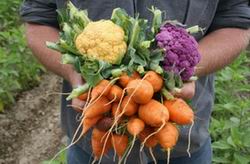|
Practical Organic Gardening InformationThere is a plethora or organic gardening information out there for all of you budding beginners (like myself). My advice is to firstly just have a go, get your hands dirty, experiment, get the children involved and make it fun! You don't have to be a farmer to grow organic! You don't need a vast amount of knowledge of complicated procedures or magic tools to create your own garden.
What is Organic Gardening?
Click here for a brief account on the
history of organic gardening.
Plants grown in healthy soil are healthy also, and more resistant to pest and diseases. Organic gardeners don't use synthetic fertilizer or pesticide on their plants, only natural pest control methods. One such method is introducing a couple of chooks or ducks in the backyard and leaving them to eat the bugs and snails.
Organic gardening aims to replenish the soil, preserve water, minimize and replace any resources the garden consumes. It works in harmony with the seasons and it means choosing plants suited to your local climate and soil conditions.
Would you like 7 Free Natural Health Reports? The Basics of Organic GardeningWhatever you plant there are a few simple principles involved. These are:
One of the most important parts of an organic garden is the fertility of the soil. A Compost heap creates organic matter that can be re-introduced into the soil to keep it nourished and encourage the growth of natural, healthy bacteria and other micro-organisms.
You need to take some time, have some patience, willingness to learn and some energy for digging, seeding, pruning, weeding, watering, recycling, composting and covering.
The results will be well worth the effort. Click here to read more on organic gardening information and getting started. Or click here for frequently asked questions.
"It is difficult to think anything but pleasant thoughts while eating a home grown tomato". Lewis Grizzard Return from Organic Gardening Information to Home Page
|





